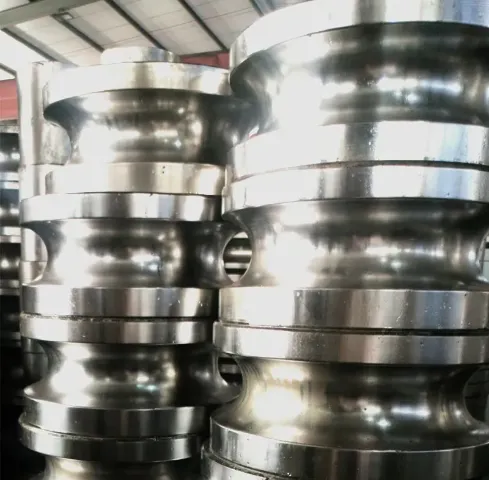Stainless Steel Pipe Mold: Key links between precision manufacturing and modern industry
Stainless steel pipes play a crucial role in modern industrial fields due to their excellent corrosion resistance, high strength, hygiene performance, and aesthetics. From petrochemicals, food and medicine to building decoration, and even aerospace, the application of stainless steel pipes is ubiquitous. The key to supporting all of this is the Stainless Steel Pipe Mold, which is a precise and complex design and manufacturing that directly determines the quality, accuracy, and production efficiency of stainless steel pipes, serving as a bridge connecting raw materials and final products.

The design of Stainless Steel Pipe Mold needs to fully consider the characteristics of stainless steel materials
Compared to ordinary carbon steel, stainless steel has higher yield strength, lower thermal conductivity, and greater resistance to plastic deformation. Therefore, the design of the machining mold must optimize the material flow path, control the processing temperature, reduce the friction coefficient, and avoid excessive stress concentration in the material during the processing, which can lead to product cracking or deformation. Modern mold design often adopts computer-aided design (CAD) and computer-aided manufacturing (CAM) technologies, using simulation software to optimize the mold structure and processing technology, ensuring the reliability and stability of the mold.
The manufacturing of Stainless Steel Pipe Mold is a precision machining process
Due to its high hardness and good wear resistance, stainless steel is relatively difficult to process. Traditional mechanical processing methods, such as milling and grinding, although can meet basic requirements, still have shortcomings in efficiency and accuracy. Therefore, the manufacturing of plastic injection molders is increasingly using advanced machining techniques such as electrical discharge machining (EDM), wire cutting machining (WEDM), etc. These non-contact machining methods can effectively reduce cutting forces, avoid workpiece deformation, and produce complex geometric shapes and microstructures, thereby ensuring the accuracy and surface quality of the mold.
The selection of Stainless Steel Pipe Mold material is also crucial
CNC mold making services need to withstand harsh working conditions such as high pressure, high temperature, and friction. Therefore, mold materials must have sufficient strength, hardness, wear resistance, and corrosion resistance. Common mold materials include alloy steel, high-speed steel, and hard alloy. According to specific application requirements, selecting suitable mold materials and conducting appropriate heat treatment can effectively improve the service life and reliability of the mold.
In summary, ກົດ mold ພາດສະຕິກ is an important component of modern industrial manufacturing, and its design, manufacturing, and material selection all embody precision engineering technology. With the continuous development of technology, more advanced mold design concepts and processing techniques will continue to emerge, further improving the quality and production efficiency of stainless steel pipes, thereby better meeting the needs of various industries. In the future, intelligent, digital, and green mold manufacturing will become an important direction for the development of Stainless Steel Pipe Mold, injecting new impetus into the progress of modern industry.
Stainless Steel Pipe Mold FAQs
What is Stainless Steel Pipe Mold? What is its main purpose?
Stainless Steel Pipe Mold is a specialized tool used for manufacturing, forming, or processing stainless steel pipes, typically used in processes such as Cold Drawing, Extrusion, or Welded Pipe Forming.
Purpose: To produce precision stainless steel pipes (such as industrial pipes, medical equipment pipes, food grade pipes, etc.), ensuring dimensional accuracy and surface smoothness.
What are the commonly used materials for Stainless Steel Pipe Mold? Why?
Common materials include:
Hard alloy (such as tungsten steel): high wear resistance, suitable for mass production.
High speed steel (HSS): Strong impact resistance, suitable for complex shaped molds.
Alloy tool steel (such as Cr12MoV): Low cost, suitable for small and medium-sized production.
Selection criteria: Depending on production volume, pipe precision requirements, and cost budget.
How does Stainless Steel Pipe Mold work in cold drawing process?
Cold drawing process steps:
- Acid washing lubrication: Stainless steel billet tubes are acid washed to remove oxide scale and coated with lubricant.
- Mold drawing: The billet tube is compressed by a conical mold (Die) to compress the outer diameter, and the core rod (Mandrel) controls the inner diameter.
- Calibration and straightening: Secondary precision drawing or straightening ensures dimensional tolerance (up to ± 0.05mm).
Key points: The taper and surface finish of the mold directly affect the quality of the finished pipe.
How to extend the service life of Stainless Steel Pipe Mold?
Maintenance measures include:
Regular polishing: Remove metal shavings adhered to the inner wall of the mold to prevent scratching of the pipe.
Lubrication optimization: Use high-performance lubricants (such as phosphating soap) to reduce friction.
Avoid overload: Control the drawing speed and pressure to prevent mold cracking.
Storage rust prevention: Apply rust prevention oil when the mold is idle and store it in a dry environment.
Common solutions for Stainless Steel Pipe Mold?
Common and countermeasures:
1: Scratches appear on the surface of the pipe.
Wear or insufficient lubrication on the inner wall of the mold.
Polish the mold or replace the lubricant.
2: Large size deviation.
Mold deformation or poor alignment.
Check the wear of the mold and recalibrate the equipment.
3: The mold wears out quickly.
Material mismatch or improper drawing process parameters.
Upgrade the mold material (such as using hard alloy) and adjust the drawing speed.
-
The World of Pipe and Tube Machinery Manufacturers: Precision and Innovationຂ່າວAug.12,2025
-
Revolutionize Your Pipe Manufacturing and Welding with Our Exceptional Machineryຂ່າວAug.12,2025
-
Navigating Pipe Machinery Costs: A Guide to Pricing for Key Equipmentຂ່າວAug.12,2025
-
Essential Pipe Fabrication Equipment: Cutting, Welding, and Support Solutionsຂ່າວAug.12,2025
-
Comprehensive Pipe Processing Machinery: From Cutting to Extrusionຂ່າວAug.12,2025
-
Advanced Pipe Fabrication Tools: Cutting, Beveling, and Welding Solutionsຂ່າວAug.12,2025


